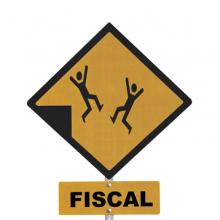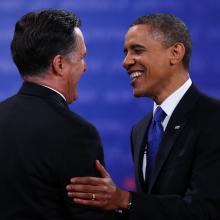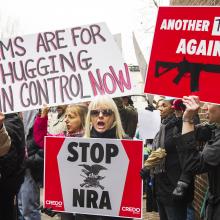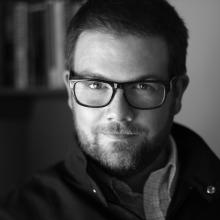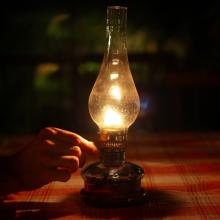Obama
SO HOW WAS your fall off the fiscal cliff? Did you drop straight to the bottom or bounce several times off jagged rocks on the way down, land in a bramble bush, and then stare back up at that annoying roadrunner? Ouch. (And why didn't the roadrunner jump off the cliff? Did he have a more reasonable approach to spending and taxation? Is he naturally more conciliatory with his opponents? Nah. He's just smarter about sudden dropoffs.)
I'm just asking because, as I write this, we're still heading toward that cliff, so I won't know if we drove off it, braked just short of it, or maybe stopped to ask directions from an old guy sitting by the side of the road in a tattered beach chair. "Yup, you keep going straight for a couple miles, then look for the coyote tracks."
There is no question that our nation is facing major fiscal imbalances—although, to be fair, our low wages are more than offset by high cholesterol. But hopefully the president—Barack "Whew!ssein" Obama—will have avoided the impending crisis by reaching a compromise with Republican leaders, although at press time it seemed he was drawing a clear line in the sand. Of course, that's easy to change because, you know, it's just sand.
But I've never cared for the cliff analogy. I think of a cliff as something you throw things off, like a stick you found, or a rock, or a Fox News pundit who is now talking positively about immigration reform. (Don't forget to make a wish before you make the toss.)
Generally, we only know how history will be remembered once it is in the rearview mirror. Something, or some things, jump out and remain indelible in the collective memories of the culture. And in a world defined by sound bytes, sometimes only a few words tell us a lot about that moment in time.
In that spirit, here are my selections for the ten most defining phrases that will stay with us from the past year.
WASHINGTON — Foes of the federal contraception mandate are cheering a Tuesday appeals court decision requiring the Obama administration to devise exemptions to the new rule for two Christian colleges.
They’re also buoyed by the D.C. Circuit Court’s reversal of lower court decisions to throw out their cases. The administration had argued that because it was crafting an exemption to the contraception rule, the cases should not go forward.
Now the cases continue, and every 60 days, the administration must report on its plan to ensure that the colleges do not have to comply with the new rule, which mandates that employers cover contraception in their health plans.
“This is a win not just for Belmont Abbey and Wheaton, but for all religious non-profits challenging the mandate,” said Kyle Duncan, general counsel of the Becket Fund for Religious Liberty, who argued the case.
President Obama addressed the nation on Wednesday morning to establish a commission led by Vice President Biden on stronger gun safety laws. Gone was the passion of his address at the interfaith service in Newtown and in place we have back the above-the-fray politician.
However, one point was clear. “If we are going to change things,” he said, “it is going to take a wave of Americans … standing up and saying ‘enough’ on behalf of our kids.”
Will Obama’s address beat the National Rife Association’s messaging strategy?
On Friday, Dec. 21, the NRA will hold its first a press conference after the Newtown, Conn., massacre—and America’s first reasonable conversation on stronger gun laws will come to an end.
Who was Abraham Lincoln? You may get different answers depending on whom you ask. He is known as the Great Emancipator. He was a self-taught rural Kentuckyian. He was a husband and father. Also, he was a pragmatic politician. The new film, Lincoln, seeks to address this question by focusing on the political struggles for the passage of the Thirteenth Amendment to the U.S. Constitution in the last few months before Lincoln’s death.
While it may be easy to see why some people would view the film in light of contemporary politics, Lincoln’s political context and Obama’s are quite different. Facile comparisons between Lincoln and Obama do both men a disservice since they serve in completely different contexts. The Civil War is not the war against terror. The abolition of slavery is not the fiscal cliff. After a point, our attempts to connect the characters and subject matter of the film Lincoln to current events seem rather forced.
Now that the election is over, policymakers and the media have refocused their attention on the looming budget battles in Washington. In January, a variety of tax increases and spending cuts will go into effect unless Congress and President Barack Obama agree on a plan to avoid what has been deemed “the fiscal cliff.”
As the country braces for another fiscal showdown in the nation’s capitol, here are five things you need to know on the issue likely to dominate the news over the next several months.
FATHER JACK MORRIS was one of those Catholic priests who ruined a lot of people for life. I'm one of them.
Father Morris passed away Sept. 30 in Spokane, Wash. He was working with the Catholic sisters and others who ran the highly regarded Copper Valley School in Alaska in the late 1950s when he took the idea of young people volunteering their time with and for Native Alaskans and helped turn it into the Jesuit Volunteer Corps. Since then, more than 12,000 people have served in the JVC, whose motto "ruined for life" reflects the fact that voluntary service often makes enduring changes in the way participants view the world. (A few years ago, Father Morris told Sojourners that the motto is "a resurrection statement"—through volunteering, he said, "you're transformed.")
I spent my first two years after college as a Jesuit Volunteer, first at the Oregon Center for Peace and Justice in Portland and then at Georgetown University's Center for Peace Studies. My mentor and boss in Portland was the center's director, Sister Michele Phiffer. She worked for years helping Catholics in Oregon understand the church's social teaching on the common good and the preferential option for people who are poor.
Perhaps needless to say, the local bishops weren't always on her side. In fact, it often appeared—even to my young eyes—that the bishops were more interested in protecting their own privilege and power than in genuinely working for the marginalized. And Sister Michele's gender seemed to be a factor in the lack of support she received from the episcopal powers that were.
Adam Nicholas Phillips: Chris, tell us a little bit about yourself.
Christopher LaTondresse: As the son of American evangelical missionary parents, I spent several formative years living in the former Soviet Union — Novosibirsk, Russia to be exact — smack dab in the middle of Siberia. My family is originally from Minnesota, so I was convinced that they were trying to find the one place on the planet colder than our home state to do missions work.
Growing up as a missionary kid, my parents taught me to take my faith seriously, to take Jesus seriously, no matter what the cost. Their example — leaving the trappings of an American middle-class lifestyle behind to pursue something they believed in — sticks with me to this day. The major lesson: There are things in this life worth making exceptional sacrifices for, especially things close to the heart of God.
I guess this is really what informs who I am, and animates my work today. True, I’m not a full-time missionary, but I’ve tried to devote my life to playing a role, however small, in what God is doing in the world. For my parents this was about planting churches and, to use the language of the Navigators (the missions organization that sent them) “making disciples”. For me it’s about taking Jesus seriously when he said, “What you do unto the least of least, you do for me.”
BALTIMORE — After sweeping setbacks to the hierarchy’s agenda on Election Day, New York Cardinal Timothy Dolan on Monday told U.S. Catholic bishops that they must now examine their own failings, confess their sins and reform themselves if they hope to impact the wider culture.
“That’s the way we become channels of a truly effective transformation of the world, through our own witness of a repentant heart,” Dolan, president of the U.S. Conference of Catholic Bishops, told the 250 bishops gathered here for their annual meeting.
“The premier answer to the question ‘What’s wrong with the world?’ is not politics, the economy, secularism, sectarianism, globalization, or global warming … none of these, as significant as they are,” Dolan said, citing many of the issues that have become favorite targets of the hierarchy.
In the wee hours of Wednesday morning, we learned that President Barack Obama would remain the leader of the free world. But his victory came at a price. He and Governor Mitt Romney now have the honor of participating in the most negative election in United States history.
“The campaign has already set records for nastiness and negativity,” Senator Joseph Lieberman commented to CNN in August. Howard Fineman echoed the sentiments on the Huffington Post, calling it “the nastiest, most abrasive personally accusatory presidential campaign in modern times.”
It’s hard to argue with their assessments, but does anyone care? And if so, what are we going to do about it?
Every campaign has a measure of negativity, but 2012 was exceptional.
Every campaign has a measure of negativity, but 2012 was exceptional. Mudslinging became an art form, and the lack of truth-telling turned “fact-checking” into a cottage industry. At one time in this country, disagreements could be settled by a good old-fashioned duel. (If you don’t believe me, ask Aaron Burr.) But in the media age, guns are no longer necessary. We have commercials.
The campaigns unleashed roughly 1,000,000 television ads during this election, and a record four out of five were negative.
I believe we can seize this future together -- because we are not as divided as our politics suggest; we're not as cynical as the pundits believe; we are greater than the sum of our individual ambitions; and we remain more than a collection of red states and blue states. We are, and forever will be, the United States of America. And together, with your help, and God’s grace, we will continue our journey forward, and remind the world just why it is that we live in the greatest nation on Earth. -- President Barack Obama, 7 November 2012
Yesterday I joined a Facebook exchange about whether the United States is indeed the greatest nation on Earth. By quite a few objective criteria, I argued, we trail other nations: health care accessibility, lifespan, maternal mortality, education, infrastructure development, employment, equality of opportunity ... well, the list is frighteningly long. We are clearly not the greatest nation on earth by any standards that people from other nations would accept, and we are becoming less great every year (for a European view of America's decline, read this sobering article - in English - from Monday's Der Spiegel).
Yesterday I also told my two little dogs -- Muffin the poodle mix and Tiggy-Winkle the terrier -- that they are the best little dogs in the world. By quite a few objective criteria, I am deluded about my dogs. Tiggy digs holes in upholstered furniture, and she barks so much that she was nearly kicked out of obedience school ("Just give up," the trainer advised; "she's going to bark, whatever you do"). Muffin snores, refuses to cooperate with her groomer, and bites large dogs. But I love my dogs passionately. I wouldn't trade them for any Westminster champions or obedience winners. Several friends, watching me interact with Tiggy and Muffin, have said they would like to be my dogs.
Last month, Lauren Anderson Youngblood, communications manager for the Secular Coalition for America, approached Broderick Johnson, a senior adviser to the Obama campaign, as they both left a conference on religion and the election.
The SCA is an umbrella group representing 11 nontheistic organizations. So who, Youngblood asked Johnson, could she reach out to with their concerns about civil rights, access to health care and education?
“He said, ‘We don’t view you as a constituency,’” Youngblood said. “He said, ‘We don’t do outreach to that community.’”
After Tuesday's election, that may soon change. According to a Pew Forum on Religion & Public Life study released last month, “nones” — those who say they have no religious affiliation or do not believe in God — are the fastest-growing faith group in America, at 20 percent of the population, or 46 million adults.
In addition, nationwide exit polls conducted Tuesday show that "nones" made up 12 percent of all voters — more than the combined number of voters who are Jewish, Muslim or members of other non-Christian faiths (9 percent), and only slightly smaller than the combined number of Hispanic Catholics and Black Protestants (14 percent).
SALT LAKE CITY — Mormons in Utah and across the nation were thrilled by the prospect that one of their own might occupy the highest office in the land.
That won’t happen now. But Mitt Romney came closer than any other Latter-day Saint since that once-beleaguered brand of Christianity burst onto the American scene in 1830.
"For many Latter-day Saints, it was a surprise that a Mormon candidate was able to make it as far as Mitt," said Stuart Reid, a Mormon and a Republican state senator from Ogden, Utah. "He’s done more than any single person in recent church history to share with the general public what a Mormon is, putting up a very positive image about Mormons and creating interest in our faith that was unprecedented."
Despite the defeat for Romney, Mormonism came out a winner, said Philip Barlow, chair of Mormon history and culture at Utah State University.
"It developed a thicker skin in the eyes of the world," Barlow said, "and the world could see that a Mormon who runs for office isn’t, by definition, a nut case."
Overall, most observers say, the Romney candidacy was a net positive for his Utah-based faith.
“Long Time Gone” is David Crosby’s anthem of hope in jeopardy. He wrote it the night Robert F. Kennedy was assassinated.
“I believed in him because he said he wanted to make some positive changes in America, and he hadn’t been bought and sold like Johnson and Nixon – cats who made their deals years ago with the special interests in this country in order to gain power,” Crosby wrote in the liner notes of the 1991 CSN boxed set. “I thought Bobby, like his brother, was a leader who had not made those deals. I was already angry about Jack Kennedy getting killed and it boiled over into this song when they got his brother, too.”
In the ‘60s, the Kennedys represented hope for change: racial equality, economic justice, and abolishing the death penalty, for example. Five decades later, you still don’t see many long-haired politicians, but that hardly seems the matter of dire culture import that it apparently was in 1968. And now we have a black president. Still, on the whole, Crosby’s words seem prescient, rather than anachronistic.
Almost 50 years later, we’re still giving legal benefits to some couples but denying them to others, not to mention that we fill our prisons with brown-skinned people, too many women are still ashamed to report rape or domestic violence, greedy people hoard resources while others go hungry, and the president who campaigned on hope hasn’t been able to bring any real change in our unjust economy.
Late last week, President Barack Obama endorsed the same-sex marriage referendum on the Washington state ballot and also formally backed a similar measure on the ballot in Maine.
The support from the president -- who in May came out in favor of gay marriage -- on Oct. 25 provided a boost for the campaign in favor of Washington's Referendum 74 just as a new poll showed that the race was getting tighter.
The announcement came in a statement issued by Paul Bell, the Washington press secretary for Obama's re-election campaign:
"While the president does not weigh in on every single ballot measure in every state, the president believes in treating everyone fairly and equally, with dignity and respect. Washington's same-sex marriage law would treat all Washington couples equally, and that is why the President supports a vote approving Referendum 74."
Nearly nine in 10 Muslim American voters pulled the lever for the Democratic candidate in the last two presidential elections, partly because of Republican policies and rhetoric that many considered anti-Muslim. In 2008, they also thought President Obama would usher in an era in which Muslims would be more accepted at home, and relations between America and the Islamic world would see improvement.
But this year, Muslim American support for President Obama shows signs of waning, which could be enough to affect the 2012 election in key swing states where a few thousand votes could have a big impact.
Several of those swing states -- most notably Virginia, Michigan, Florida, Pennsylvania, Colorado, and Ohio -- have enough Muslim voters to turn a tight race, experts say.
According to a poll of 500 Muslim American voters released Wednesday (Oct. 24) by the Council of American-Islamic Relations in Washington, 68 percent of Muslims said they would vote for President Obama, while 25 percent were undecided. The poll, which had a margin of error of plus or minus 5 percentage points, also found that 91 percent of Muslims intend to vote.
The largest slice of President Barack Obama’s religious coalition -- at 23 percent -- is not very religious.
They’re the “nones,” also known as unaffiliated voters, according to a new American Values Survey by the Public Religion Research Institute.
Gov. Mitt Romney’s biggest bloc of religious voters are white evangelical Protestants, at 37 percent, followed by white mainline Protestants and white Catholics, each at 19 percent. Comparing the candidates' supporters, the more diverse religious and nonreligious coalition that's favoring Obama tends to be younger and growing, which could make it easier for Democrats to win elections in the future.
But there’s a down side for Obama, said Dan Cox, PRRI’s research director.
“The people most likely to support him are the least likely to vote: Latinos, the millennials (voters 18-29), and the unaffiliated,” Cox said.
More American Catholics believe their religious leaders should be focused on issues related to poverty and social justice during this election season, rather than spending time and energy on other issues such as abortion, according to a new survey released this week by the Public Religion Research Institute.
The results of the 2012 American Values Survey demonstrate that American Catcholics -- and the "Catholic vote" -- is far from the monolith some politicians might like to believe they are.
"The survey confirms that there is no such thing as the 'Catholic vote,'" Robert P. Jones, CEO of PPRI and co-author of the report, told Reuters. "There are a number of critical divisions among Catholics, including an important divide between 'social justice' and "right to life' Catholics."
For instance, on the question of the public engagement of the church, the 2012 American Values Survey found important divisions between Catholics who prefer a “social justice” emphasis that focuses on helping the poor and Catholics who prefer a “right to life” emphasis that focuses on issues such as abortion.
The Romney-Ryan ticket is the first Republican presidential campaign in history without a Protestant candidate, but this hasn't deterred evangelicals from launching massive get-out-the-vote and registration efforts to help Mitt Romney and Paul Ryan win the White House.
Faith and Freedom Coalition founder Ralph Reed, who has been involved in pushing evangelicals to the polls since 1988, has launched what he described as the "largest voter registration, voter mobilization and get-out-the-vote effort ever targeted at evangelical voters," specifically those who would be new additions to the voter rolls.
Reed's effort targets not only presidential swing states but also those with critical Senate and House races to help elect conservatives down ballot as well.
Working with third-party contractors, Reed and his group were able to identify and mail voter registration packets to slightly less than 2 million unregistered evangelicals based on everything from Census data to television preferences to what books they may have purchased online.
"There are millions of Bibles purchased in the United States every month. Most people aren't interested in finding out who is buying those Bibles — I am," Reed said.
Reed said he has a voter file of 17 million evangelicals in battleground states, and each household will be contacted seven to 12 times before the election through mail, email, phone calls and text messages.
Why, exactly, does it matter if President Barack Obama gave a lackluster performance in the recent presidential debate?
These quadrennial campaign sideshows have nothing to do with one's capability, preparation, aptitude or suitability for the presidency.
Why does Gov. Mitt Romney's spirited performance matter? What does a “victory” by one candidate mean, other than momentary bragging rights?
Surely we know that these debates are about as meaningful as an Oscar winner's thank-you speech. What we want from a president is a steady hand in dealing with a wicked and wayward world, a collaborative spirit in bringing a broad reach to government, and a magnanimous spirit in consoling war widows, helping victims of disaster, protecting the weak from the relentless predations of the strong, and trying to preserve an “American Dream” to which all, not just a few, are invited. We want signs of character, not a telegenic mien.
Presidential debates are like first visits to possible in-laws. You hope not to belch at supper — and then you return to the world where you are actually exploring marriage and building a life.
